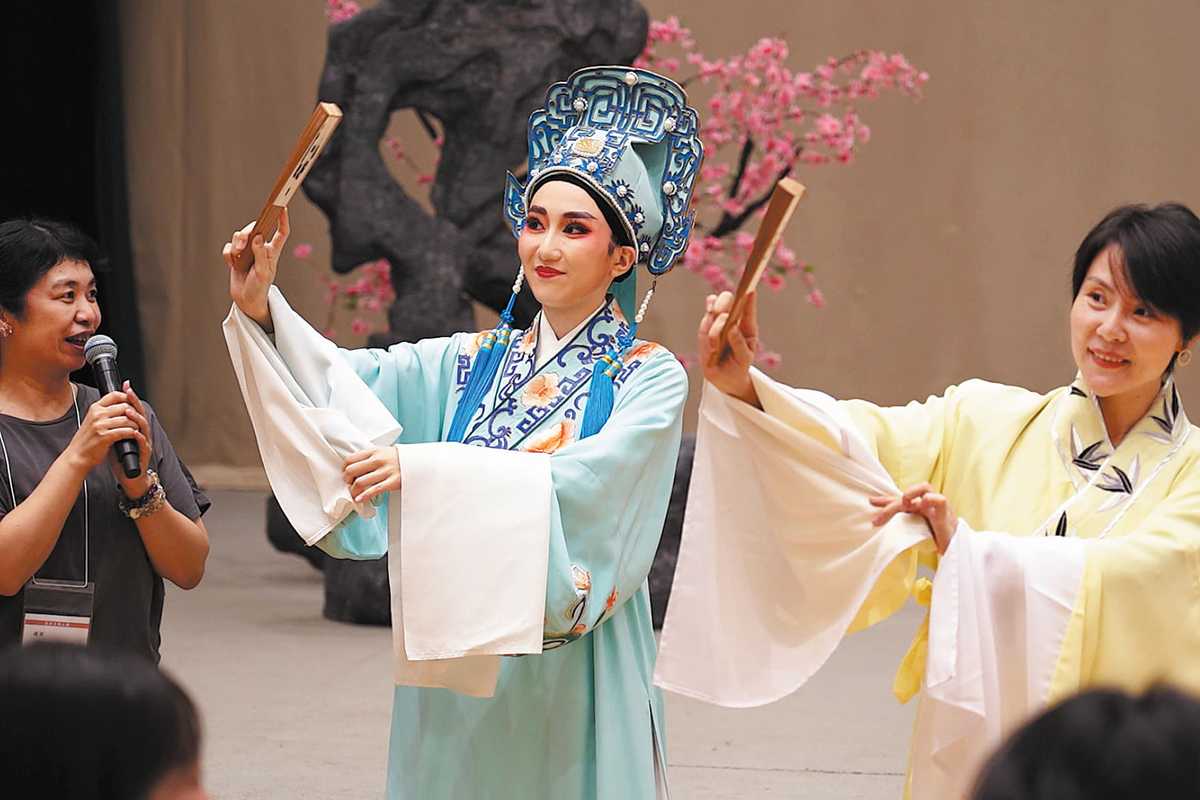
Rina Maejima (center), a student from Chuo University, tries on the makeup and costume of Yueju Opera during her visit to Shanghai in September. FENG ZHANQI / FOR CHINA DAILY
Japanese students expressed a strong desire to gain a true understanding of China and to foster mutual respect and friendship between the people of Japan and China at an event held in Tokyo on Wednesday.
Representatives from the "100 Japanese University Students Visiting China" program, who visited China this year, gathered to share insights from their trips.
The program, launched this year, was hosted by the Chinese embassy in Japan. A total of 100 people visited Sichuan province in March and Shanghai in September through this program, with the majority being Japanese university students.
Their visit to Sichuan province in March spotlighted cultural links between the two nations, including experiences with the giant panda Xiang Xiang after her return to China, relics from the Three Kingdoms era (220-280), and Sichuan cuisine.
The September visit to Shanghai brought a focus on technological innovation, historical heritage, smart city development, and urban planning.
Tsubasa Tajima, a student of the Faculty of Science and Engineering at Chuo University, was particularly struck by the rapid advancements in China's tech sector. During a visit to Chinese tech giant Baidu in Shanghai, he observed autonomous driving technology up close.
He said that although Japan also develops such technology, he felt that China was leading in practical implementation.
"I was particularly impressed with Baidu's technology for detecting pedestrians and obstacles and automatically adjusting routes," said Tajima.
"Watching Meituan's drone delivery system in real-time — from placing an order by smartphone to having it delivered by drone — was also incredible. I never expected to see drones delivering food and daily goods so soon," he added, referring to the shopping platform.
Risa Nomachi, who is majoring in Chinese at Chuo University, had a memorable experience watching Yueju Opera in Shanghai. Recognized as an intangible cultural heritage, Yueju Opera is a traditional Chinese performance art.
"Before this visit, I knew almost nothing about Yueju Opera, but I was immediately captivated by its beauty when I saw it live," she said.
"I'm eager to learn more about the history and stories of Yueju Opera and plan to see another show in Shanghai soon."
Nomachi also noted that the program gave her insights into aspects of China she could only experience by being there.
Alongside historical landmarks and cultural heritage, she said she was impressed by China's modern lifestyle, including the widespread use of electronic payments.
"Throughout my entire stay in Sichuan and Shanghai, I didn't use cash even once — it was surprising to see electronic payments accepted even in small local shops," she said.
Creating opportunities
Chinese Ambassador to Japan Wu Jianghao highlighted the value of creating opportunities for young people from both countries to share experiences, which he believes builds a foundation for future exchanges and strengthens the connection between Japan and China.
Sun Ran, editor-in-chief of Live Japan, a Chinese-language media in Japan, emphasized that youth exchanges between Japan and China form the grassroots foundation of friendship and represent a hopeful future for bilateral relations.
"The program gave students a new perspective on China and facilitated personal growth," said Sun, the leader of the delegation.
Shi Yong, minister at the Chinese embassy in Japan, noted that the Japanese students' visits strengthened their understanding of traditional Chinese culture.
He stressed that the Sino-Japanese friendship benefits from deepened cultural connections that foster mutual knowledge and affection in the current era.
jiangxueqing@chinadaily.com.cn